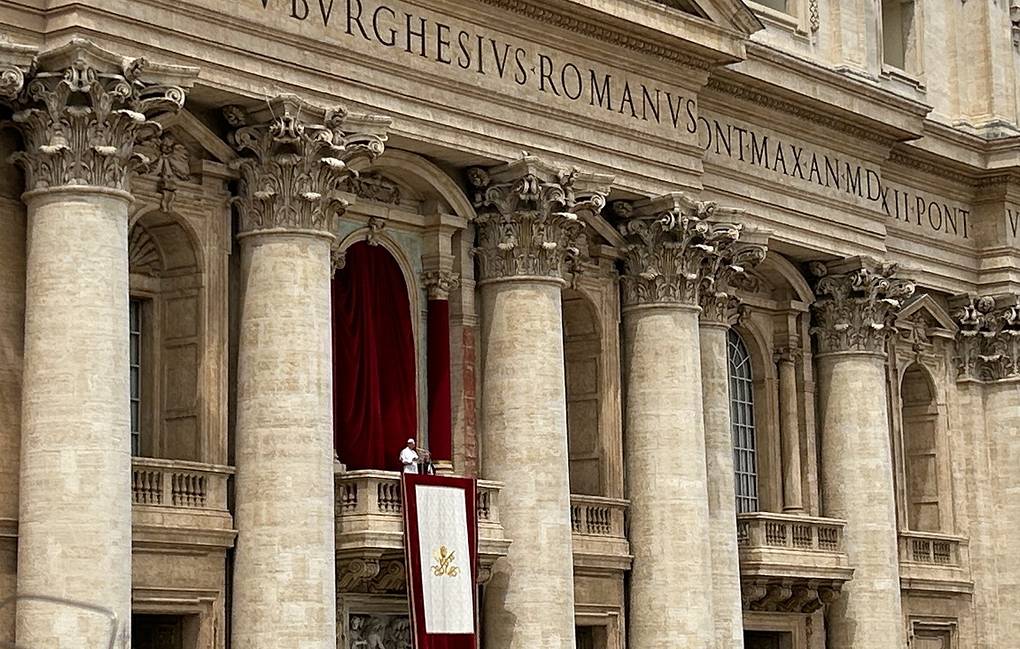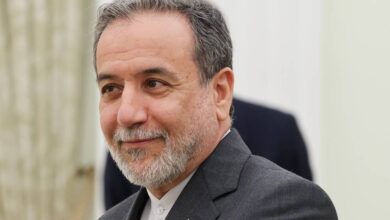Press review: Russia eyes Vatican talks and EU prepared for trade truce with US
Top stories from the Russian press on Friday, May 23rd
MOSCOW, May 23. /TASS/. Russia is open to holding peace negotiations with Ukraine in the Vatican; the EU has proposed a limited tariff relief deal to the US; and Israel is preparing for potential military strikes on Iran’s nuclear facilities as US-Iran nuclear talks hover near collapse. These stories topped Friday’s newspaper headlines across Russia.
Izvestia: Russia eyes Vatican as possible site for Ukraine talks
The Russian Ministry of Foreign Affairs has not ruled out the possibility that a new round of negotiations between Russia and Ukraine could take place in the Vatican, Izvestia has learned. While no final decision has yet been made regarding the venue for the next meeting, Pope Leo XIV has previously confirmed his willingness to offer the Vatican as a platform for dialogue between the parties. Experts believe the European Union is keen on hosting Russian-Ukrainian negotiations on European territory, which would allow EU member states to engage in the conflict-resolution process.
-
"There is indeed a possibility, but such matters always depend on the mutual willingness of the parties involved. There is a format known as ‘talks about talks,’ during which the location, agenda, themes, and the framework for the composition of the delegations are preliminarily agreed upon. These kinds of preparations are conducted prior to any formal session," Special Representative of the Russian Ministry of Foreign Affairs for Crimes of the Kiev Regime Rodion Miroshnik told Izvestia. "Rome is one of several venues that could potentially be considered for negotiations, but only if both sides agree," he added.
The Vatican is not a member of either the European Union or NATO, nor is it on Russia’s list of "unfriendly" nations. It currently represents the most impartial territory in Europe, Director of the Program Department at the Russian International Affairs Council Svetlana Gavrilova stressed.
"Istanbul remains a favorable location for the Ukrainian side, given the close relationship between Erdogan and Zelensky, their military-technical cooperation, and Ankara’s general political alignment," expert at the Valdai Discussion Club Andrey Kortunov told Izvestia. "However, Turkey maintains a ‘dissident’ position on many issues within NATO and the broader Western alliance. In this context, if the objective is to preserve the cohesion of the Western coalition, the Vatican may in fact be more appropriate than Istanbul," he added.
Nonetheless, there are divergent views. According to Elena Ponomareva, Professor at MGIMO University, the Vatican cannot be considered a truly neutral territory, as it is deeply embedded within the Western institutional framework.
Other potential venues beyond Turkey include Saudi Arabia, the United Arab Emirates, and Qatar. Countries in the Global South, such as Brazil, India, and others that have previously proposed peace initiatives, may also host negotiations. However, these nations are geographically removed from the core of the conflict.
Vedomosti: Is EU prepared for trade truce with White House?
The administration of US President Donald Trump has received a revised proposal from the European Union regarding a potential trade agreement. According to Bloomberg sources, the document contains several provisions that align more closely with US interests. Specifically, it outlines a gradual reduction of tariffs to zero, albeit limited to "non-sensitive" agricultural and industrial goods. The next round of trade negotiations between the partners is scheduled to take place in June. Experts interviewed by Vedomosti noted that the EU’s planned 100% tariffs on Russian nitrogen-based fertilizers will significantly harm European farmers, prompting Brussels to seek increased food imports from the US as a counterbalancing measure.
Bloomberg reported that the EU is simultaneously preparing to implement retaliatory measures should negotiations with Washington fail to yield a satisfactory outcome. Indeed, as early as May 8, the European Commission officially announced ongoing internal consultations regarding a possible restriction on exports to the United States worth 95 bln euro. This measure would target a "broad range of industrial and agricultural products."
The issue of US tariffs on European goods is a serious one, Alexander Kamkin, Associate Professor at the Financial University under the Russian Government, told Vedomosti. In his assessment, the automotive and aerospace sectors, as well as the chemical and pharmaceutical industries, are particularly vulnerable. Tariffs would place an additional burden on European manufacturers, potentially resulting in factory closures and job losses.
For Brussels, ensuring uninterrupted imports of food products from the US is a near-term priority. This urgency is driven by the EU’s forthcoming decision to impose 100% tariffs on nitrogen-based fertilizers from Russia — a move expected to significantly impact European farmers. Consequently, Brussels appears willing to lower prospective tariffs on agricultural goods from the United States, Kamkin said. As for the current 10% tariff, he believes the Trump administration is unlikely to agree to any substantial reductions.
Izvestia: China deepens ties with Northern Sea Route amid Asia-Pacific frictions
China has expressed growing interest in broader use of the Northern Sea Route amid escalating tensions in the Asia-Pacific region, Russian Minister for the Development of the Far East and the Arctic Alexey Chekunkov told Izvestia. However, Beijing has yet to commit to large-scale investments in the Arctic project.
Nonetheless, Chinese involvement is steadily increasing: by the end of 2024, the number of voyages conducted by Chinese companies along the Arctic route had nearly doubled compared to previous years.
"For China, the Northern Sea Route is strategically significant, both in terms of economic efficiency, being 40% shorter than the southern route, and as a geostrategic alternative in case tensions escalate in the South China Sea," Chekunkov noted.
On May 21, new joint naval exercises between the United States and the Philippines were announced in the South China Sea. Recently, China has been repeatedly embroiled in incidents with the Philippines in disputed waters of the South China Sea, a situation further complicated by the continued interference of the United States in the Asia-Pacific region. Nevertheless, such regional tension is not yet critical for Beijing, Alexey Maslov, Director of the Institute of Asian and African Studies, told the newspaper.
Beijing would fully pivot to the Northern Sea Route only in the event of a major war in the Pacific — a scenario that currently remains highly unlikely, Head of the Sector of Economy and Politics of China at the Center for Asia-Pacific Studies at the Institute of World Economy and International Relations Sergey Lukonin told Izvestia. As such, China currently views the Northern Sea Route as one of several tools in its broader risk management strategy.
Beyond its trade and logistics potential, the development of the Northern Sea Route also fosters business growth in the liquefied natural gas (LNG) sector, in which China has a vested interest, Director of the nonprofit organization Eurasian Youth Projects Nikolay Marchenko told Izvestia.
"As is well known, China is one of the principal investors in Arctic projects such as Yamal LNG and Arctic LNG," the expert noted.
Nezavisimaya Gazeta: Israel drafts emergency strikes on Iran’s nuclear facilities as US-Iran dialogue falters
Israel is drafting a contingency plan in the event of a breakdown in nuclear negotiations between the United States and Iran. The Israel Defense Forces (IDF) have begun simulating a military scenario targeting the Islamic Republic, which includes a weeklong campaign of strikes against Iran’s nuclear infrastructure.
Whether Prime Minister Benjamin Netanyahu will secure any form of approval for this plan from the White House, currently still engaged in talks with Tehran, remains uncertain, Nezavisimaya Gazeta writes. A new round of nuclear consultations between the parties is scheduled for May 23 in Rome, though the process remains fraught with serious disagreements.
According to Israeli sources cited by the news outlet Axios, the proposed military campaign would not be a single strike: under the most adverse scenario, the Islamic Republic could face a prolonged series of Israeli attacks on its nuclear facilities lasting at least a week.
In response, Major General Ali Mohammad Naeini, an official spokesperson for Iran’s Islamic Revolutionary Guard Corps (IRGC), declared that the Jewish state would face a "crushing and decisive response against its exposed and limited territory".
Previous rounds of these nuclear talks were held in Oman. Now, Tehran has turned to Muscat with a request to persuade the Trump administration to ease its rigid stance on enrichment, the opposition satellite channel Iran International reported, citing two diplomatic sources in Tehran. "Given the sensitivity of Iran’s financial markets, its currency, gold, and stocks, to the outcome of these negotiations, the message (to Oman) emphasizes that a diplomatic compromise is feasible if the United States adjusts its position," one source told Iran International.
Nevertheless, the sources noted growing anxiety in Tehran over the absence of a clear diplomatic alternative should negotiations entirely collapse. According to them, the Iranian leadership currently lacks a contingency strategy for addressing the country’s internal economic crisis or governing effectively in the event of an Israeli operation.
Kommersant: Russia seeks stricter rules for foreign firms reclaiming assets
The Russian authorities are increasing the conditions under which foreign investors may return to the Russian market — under proposed legislation, new owners of previously abandoned assets may refuse to honor options granting foreign investors the right to reclaim their former companies. The bill has been approved for a second reading by the State Duma Committee on Property Issues, although, as Kommersant has learned, the proposed measures will continue to be reviewed next week. These restrictions are deemed necessary to support domestic manufacturers and promote import substitution. Legal experts caution that refusals to honor buyback options could trigger lawsuits. However, the draft legislation outlines legal grounds for such refusals, thereby mitigating the risk of litigation.
The committee reported that the draft legislation will allow Russian citizens and companies to refuse the return of assets to foreign investors under certain conditions: specifically, if there is a connection to "unfriendly" countries, if the sale of the assets was conducted in bad faith, or if the seller failed to fulfill obligations to employees and creditors.
However, according to a source familiar with the document, the government sub-commission will not make decisions on refusals to permit asset reacquisitions — such decisions are intended to be made in court. Another source indicated that discussions on the bill will continue next week.
Legal experts interviewed by Kommersant noted that refusals to allow reacquisitions could lead to lawsuits, including demands for the forced return of assets or the imposition of penalties or damages.
Other implications of the tightened framework are reputational in nature.
According to attorney Natalia Popravko, investors from Asia and the Middle East may demand a higher risk premium or even opt out of using repurchase clauses altogether. "Parties seeking to enter into agreements will factor in these changes and seek alternative means to protect their rights," Managing Partner of Novator Legal Group Vyacheslav Kosakov added.

